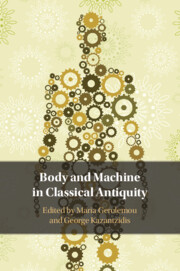Book contents
- Body and Machine in Classical Antiquity
- Body and Machine in Classical Antiquity
- Copyright page
- Contents
- Figures
- Contributors
- An Introduction to Body–Machine Intersections
- Part I Blended Bodies
- Part II The Technological Body
- Part III Towards the Mechanization of the Human Body
- Chapter 7 Aristotle on the Lung and the Bellows–Lungs Analogy
- Chapter 8 The Ill Effect of South Winds on the Joints in the Human Body
- Chapter 9 The Beauty That Lies Within
- Chapter 10 The Mechanics of the Heart in Antiquity
- Chapter 11 The Mechanics of Galen’s Theory of Nutrition
- Chapter 12 Iatromechanism and Antiquarianism in Morgagni’s Studies on Celsus, 1720–1761
- Conclusions or From Antiquity to the Early Modern
- Index of Passages
- General Index
- References
Conclusions or From Antiquity to the Early Modern
from Part III - Towards the Mechanization of the Human Body
Published online by Cambridge University Press: 13 July 2023
- Body and Machine in Classical Antiquity
- Body and Machine in Classical Antiquity
- Copyright page
- Contents
- Figures
- Contributors
- An Introduction to Body–Machine Intersections
- Part I Blended Bodies
- Part II The Technological Body
- Part III Towards the Mechanization of the Human Body
- Chapter 7 Aristotle on the Lung and the Bellows–Lungs Analogy
- Chapter 8 The Ill Effect of South Winds on the Joints in the Human Body
- Chapter 9 The Beauty That Lies Within
- Chapter 10 The Mechanics of the Heart in Antiquity
- Chapter 11 The Mechanics of Galen’s Theory of Nutrition
- Chapter 12 Iatromechanism and Antiquarianism in Morgagni’s Studies on Celsus, 1720–1761
- Conclusions or From Antiquity to the Early Modern
- Index of Passages
- General Index
- References
Summary
The idea of the body as a machine constitutes one of the central analogies in early modern Western thought. From Descartes’ Treatise of Man (written in the 1630s) to the Iatromechanist School of medicine, and from La Mettrie’s Man a Machine (1747) and de Vaucanson’s automata to science fiction’s fascination with cyborgs, robots and androids, mechanical models have been employed to reproduce and mimic one aspect or another of life itself. One of the aims of the present collection of essays has been to show that the conceptual origins of this early modern body–machine concept can be traced back to texts, scientific theories and ideas of classical antiquity. The technological artefact – be it a simple device or a more complex machine – in the texts and authors which we have been exploring does not stand in isolation from the flesh, bones, fluids and organs that make up the human body; on the contrary, they intersect with the latter in a number of significant ways.
- Type
- Chapter
- Information
- Body and Machine in Classical Antiquity , pp. 318 - 320Publisher: Cambridge University PressPrint publication year: 2023

